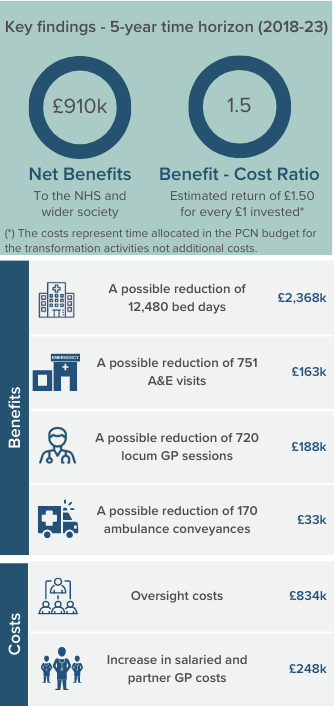Over the last 5 years, the Foundry Healthcare Lewes PCN has implemented transformation changes based on a population health management approach. Centred around a population segmentation approach and a re-engineering of the workforce, the interventions have enabled them to better serve its population based on need, aiming to improve continuity and access to care.
Unity Insights, commissioned by KSS AHSN (now trading as Health Innovation KSS), have completed a retrospective impact assessment of the model of care introduced at the Foundry – using quantitative and qualitative techniques, and health economic modelling.
Overall, the results from the health economic analysis demonstrated a positive return on investment – indicating that for every £1 of PCN funding invested, the interventions were estimated to return £1.50 to the healthcare system. The evaluation also uncovered several other benefits of the Foundry model, particularly for patient outcomes, in developing a sustainable workforce model, and in fostering a positive culture/ working environment for staff through a challenging period for primary care services.
The programme is based on a population health management approach. This involved segmenting the registered patient population and re-engineering a multi-disciplinary and integrated team to create a needs-led model of primary care.
In order to complete a retrospective impact assessment of the model of care introduced at the Foundry, quantitative and qualitative techniques were utilised, alongside health economic modelling.
Qualitative methods involved gathering existing survey result findings and conducting interviews on patient and staff perspectives. Patient surveys analysed included, The NHS England GP Patient Survey and The Foundry Healthcare Lewes Patient Access Survey. For staff perspectives, The Qualitas GP staff survey results were obtained. For more in-depth insights, interviews were completed with ten patients and eight staff members.
Quantitatively, the evaluation sought to understand the quantifiable impact of the Foundry model, analyse potential costs and benefits to support the health economic model, and identify any additional implications of the interventions. This required utilising a range of data sources including Foundry operational data, hospital episodes statistics (HES) data and quality and outcomes framework (QOF) data. To estimate the net impact of the interventions on the metrics of interest, a comparator analysis was conducted. Results from this were then used to complete a difference-in-differences analysis which measured this impact of the specific interventions. See more on the results in the key findings below.
Health economic modelling was also performed, using a cost-benefit analysis. Several sources were used to inform the model including primary care and secondary care datasets, academic research and statistics from relevant public-sector bodies.
Despite being the lynchpin of the healthcare system, primary care faces many pressures including increased GP workload, staff shortages, and decreased patient satisfaction particularly due to long wait times. To overcome these pressures, the Foundry PCN was formed, and a number of interventions were implemented with the aim of building a more resilient primary care model focussing on continuity and access to care.
Quantitative key findings:
By adopting the Foundry’s model, estimated savings can also be seen in the reduction of 12,480 non-elective bed days, 751 fewer A&E visits, 170 fewer ambulance conveyances and 720 fewer locum GP sessions over the study period.
Qualitative key findings:
- Patients at the Foundry reported a high level of satisfaction with the care received with shared decision making, confidence and trust in the healthcare team being highly rated.
- Patients had difficulty in accessing care, with 83.6% of survey respondents and 69.6% of interviewed patients reporting difficulty contacting the practice.
- Responses regarding continuity of care were mixed as 90% of the interviewed patients were not aware of the healthcare team they are assigned to.
- Another dominant theme in the patients’ accounts was the lack of clarity about what the merger and what the Foundry represented.
- Staff engagement showed that overall, staff members praised the culture and leadership at the Foundry and recognised the benefits of collaborative working.
- Staff noted lack of working space and balancing workload as current limitations yet to address.
Health economic results:
The health economic analysis demonstrated a positive return on investment – indicating that for every £1 invested, the interventions were estimated to return £1.50 to the healthcare system.

“Really interesting […], lots of really valuable insights here and pointers to what we need to do next!”
Geraldine Hoban Managing Director at FHL PCN
Related content
Get in touch with us
- Phone
- Email enquiries@unityinsights.co.uk
